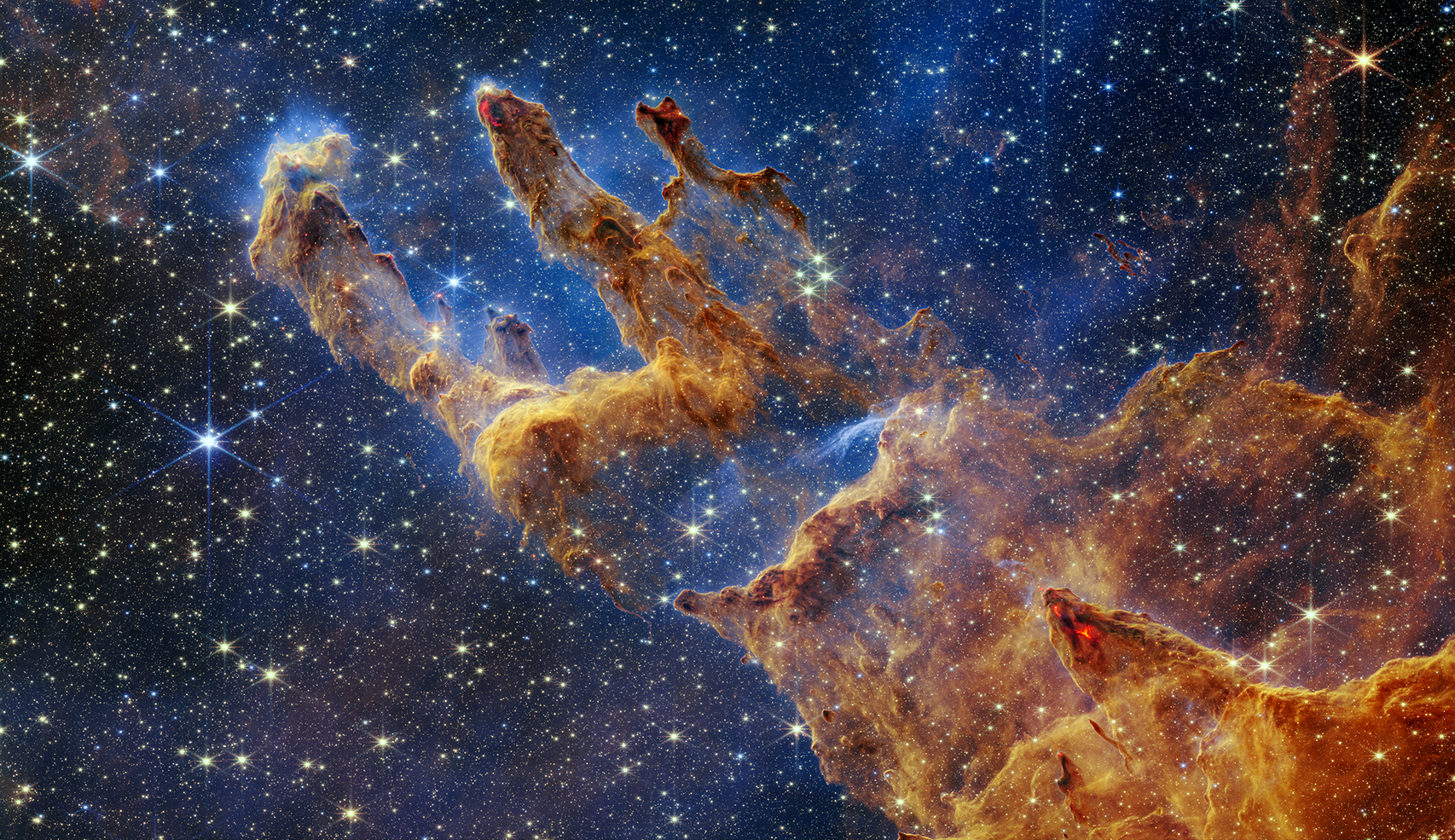-
Posts
2018 -
Joined
-
Last visited
-
Days Won
5
Content Type
Profiles
News
Forums
Blogs
Gallery
Events
Blog Comments posted by The Bookwyrm
-
-
I know it's been a while, but....I'm commenting here again!
First of all, that is a very nice explanation of general and special relativity. While I know a lot about space and physics, I haven't seen those theories layed out so clearly until now, so thank you!
I do generally understand time dilation; the faster you move through space, the slower through time...at least relative to those around you. It's like a Cadmium bubble, sort of, at least in effect.
Gravity does the same thing, for some reason, though that's a whole different story...
If you somehow magically happened to reach lightspeed, you'd functionally be moving infinitely fast through space, and then you'd stop moving at all through time. Time itself would not pass for you.
When you travel infinitely fast through space, you halt all movement in time. So....what would happen if you somehow magically halted all movement through space? Would you then be travelling infinitely fast through time? Or am I just thinking crazy thoughts?
This is a less in depth comment than some of my other ones.
0 -
I am a science nerd, but I am also religious. I think that humans are definitely pushed by biological needs. But if that was our only drive, we would have stopped a long time ago.
As for the other two options, both are viable. Our agency, our free will, drives all people forward. Each person's agency is different, of course, but generally, I think humans have agency's that strive for something better. This is what has let us progressed so far.
I do think there is a Virtue, but I believe this "external good" as you called it is just as much internal as it is external. The way I see things, the virtue of God that exists externally also exists within every person, to a degree. I believe that as God's children, his divine nature is in each of us. That universal virtue, combined with our free will and our daily biological needs, is what drives us forward to progress and grow.
I didn't mean to wax religious there at the end. I realize that not all people will share all my viewpoints, so feel free to share yours or argue against mine below.
1 -
If you had a REALLY good person in charge, then I think a monarchy (with some other government offices, of course,) would be the best form of government. A true good ruler is going to do the same thing as a democracy, in making sure that the wants and needs of the people are met. A monarchy is also going to skip over all the arguing that happens in a government with multiple leaders, making it more efficient.
But since a perfect ruler is impossible, and good rulers are basically nonexistent, other forms of government work better practically.
0 -
I put yes on the second question, but the mechanics of it would be very wonky.
Reminds me of this: https://imgs.xkcd.com/comics/a_bunch_of_rocks.png
So yeah, possible, but difficult and not in the way most people would think.
3 -
Okay, sorry I'm a tiny bit late. I've been a little busy.
QuoteThe closest start to us is Proxima Centauri (which I knew off the top of my head, btw; FEAR MY POWER).
....Isn't this common knowledge? Or is that reserved only for Space Nerds?
I agree, interstellar travel with where we are technology wise is a long way off. I think it's definitely possible, and achievable, in the future, however. Call me an optimist, but we shouldn't completely ignore those other stars and distant exoplanets. Yes, it may be two or three centuries down the line before we even get to the point where we have a solid plan to send humans to another star system, but it's something that can, and hopefully will, happen someday.
But for those two or three centuries, I agree, we should focus on Solar System colonization.
Moon! Yes, lots of good resources there. As I said in my last way-too-long rant, the moon also has water ice that could be converted into Hydrogen fuel. That, plus the H-3 you talked about and the fact that it has low gravity, would basically open up the rest of the solar system to us. So yes, the moon is definitely a place we want to be going to.
Mars is literally the only other planet in the solar system that we can actually walk on conceivably without dying. It's pretty similar to Earth (Or at least used to be) but that in no way makes it hospitable, like you said. Mars is simply a good target because it's close, relatively hospitable, and can be used as an outpost for more exciting destinations.
Venus: I have no idea why you'd want to go to Venus. But the whole "Let's turn it into a battery!" thing was new to me, so I guess there is some kind of resource there for us to harvest. Thank you for teaching me new things! It's also possible that there is something helpful and useful there, we just haven't found it yet, and we need to get a lot more advanced in technology before we can explore widely enough to find that resource.
Mercury: Basically everything you said above fits what I thought about Mercury.
Jupiter: Yes, the moons are viable and we can mine resources there. Maybe even set up stations and colonies. (I'd need to look at exactly how shielded from radiation those moons are, again...) But, you're forgetting something called....
SATURN!!!!! Yes, this is my favorite planet, so I may be somewhat biased, but seriously. Saturn's moons are just as viable as Jupiter's. (Unless once again I'm missing some important information on the lack of radiation shielding.) Saturn has more confirmed moons than Jupiter, not even counting the rings, and these moons hold just as many things for us as the ones of Jupiter. Jupiter's moon Europa may have life, but so may Saturn's moon Enceladus. Heck, we've discovered organic molecules spewing from gigantinourmous geysers on Enceladus! The other moons most likely contain the same resources that the ones of Jupiter do, and Saturn's rings are currently made almost entirely of water-ice, which is a helpful resource. Titan is an interesting world for research (because I like science), but it is also one of the most Earth-like worlds in the solar system. It has a storming atmosphere! And there are probably lots of resources there, too.
And yes, Saturn is pretty. But that doesn't mean we should skip it.
Uranus and Neptune: We don't really know what's out there yet, so there may be some kinds of viable resources. We should start with some scientific expeditions before we send economic ones. Who knows, maybe they have some valuable minerals on their moons, or something along those lines.
Pluto: If we make Pluto a planet again, then we have to make, like, at least five other bodies - and possibly dozens or even hundreds more - planets as well, because they all follow the same rules as Pluto. So Pluto should not be a planet. But it can be a really, really, really cool dwarf planet. (Seriously, there are some cool things on Pluto. And it has five moons.)
On a more serious note, the entirety of the Kuiper belt probably holds vast amounts of resources for us to harvest. Both on the dwarf planets and the asteroids. I briefly mentioned it above, but the Kuiper belt is huge, so it has likely tens of thousands of asteroids, and maybe hundreds of undiscovered dwarf planets. Which means lots of places to get resources from. The asteroid belt is much smaller, but there are also lots of resources there for us.
So there you have it. My next huge rant, which is mostly about why Saturn is worth our time.
2 -
I put "Um...ants can't screw in lightbulbs???", but I think that if they were given direction and had the capacity to understand such direction, they could probably do it. I just don't know how many it would take.
The AI one stumped me. I had never really thought about it. I think that an AI could hypothetically get pretty close to sentience, to the point of achieving it, but I do not know, or what the implications of that would be. It might be that it could simulate certain aspects of sentience, to the point that living beings perceived it as sentient, but it wasn't actually sentient itself.
I do believe in souls. (I am religious, see my signature.) I don't know if a sentient AI would have a soul, though.
Good questions! They made me think.
1 -
Hm. It is a little unclear on how advanced this Space Opera will be, or if it will span from about a time in the present-near future to a galactic civilization.
.......(There is some advanced technology in Skyward Sword, though....)
1 -
What if it wasn't for the heck of it, but because it was being annoying when you were trying to eat lunch?
Also, what does this have to do with a space opera?
0 -
In response to your Biology section, @Channelknight Fadran, I would like to talk to you about hypothetical types of biochemistry on exoplanets sometime. I will wait and see until you make the biology blog post.
0 -
Thanks, @The Wandering Wizard.
As a tried and true SPACE NERD, I would like to thank you, @Channelknight Fadran, for teaching me some things that I did not know. I had no idea that NASA was coming up with ideas for space-railguns, or skyhooks that would launch your payload to your destination faster. This is a well written...(what is this? Blog post?)...thing....that explains space travel in ways that I did not know were possible. (You did use the word "yeet" a little to much, though...)
Sadly, I am more interested in the scientific areas of space than the engineering aspects. I probably know more about space travel than the average human, but you obviously know more than me. I tend to get more into the hypothetical forms of FTL (And also forms of FTL that could never really exist in the real world) and things like interstellar arks and planetary colonization.
A few thoughts:
If you were trying to launch humans into space with the railgun, wouldn't the g-forces of that super-fast acceleration smoosh them? Or am I vastly overestimating the railgun's capabilities and vastly underestimating the "human squishiness quotient" as M-Bot calls it?
I think, to answer your "How do we make sure things don't go wrong" question, it's just that as a civilization advances in their technology, it will generally become safer. I mean, people drive in cars or fly in airplanes all the time, but if you sit down and think about it, you're in a steel projectile hurtling through three dimensions and high velocities with so so so many things that could go wrong and kill you. But no one actually sits down and think about it. So how long would it take for space travel to get safe enough that, for the most part, you don't have to worry about how terrifying it is? (You kind of talked about this, I just wanted to elaborate.)
What about gravity slingshots?
Hydrogen, at least for our time and level of technology, is a very efficient fuel. While it's true that compared to some kinds of propulsion that can be achieved in the future it's basically redundant, I don't think we should put that handy chemical reaction of H2+O2=H2O out of the picture yet. At the poles of the Moon, there are large stores of ice that have been untouched for eons. If someone were to go and mine that solid water, melt it, and do electrolysis on it, you have all of the Hydrogen and Oxygen that you need to burn for fuel. And because the Moon has much less gravity than the Earth, if we turn the north and south poles of the Moon into fuel mines and spaceports, the solar system could quite easily open up for us. You're completely right that we need to move on to a more advanced method of propulsion in the future. But I think Hydrogen fuel could be helpful in other ways, at least in the early eras of expansion.
So yeah, there's my random rant. Sorry it's so big. If you want to talk about big galactic-scale space opera or FTL sometime, just ping me, and I can rant some more.
Edit: A quick internet search made me realize we should actually be building the railgun on the moon.
1




Beyond Lightspeed
in The Perfect Space Opera
A blog by Channelknight Fadran in General
Posted
Wait, but...what about Wormholes?